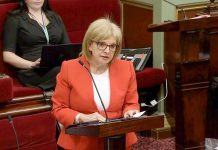
Sparks alarm among farming communities
By Deanne Jeffers
THE Federal Government has announced it will push ahead with expanded water buybacks in the Southern Murray-Darling Basin, increasing voluntary water purchases from 170 gigalitres (GL) to 300GL under its updated Restoring Our Rivers Framework.
Water Minister Murray Watt announced the additional 130GL at last week’s Basin Leadership Summit 2025 held in Adelaide, sparking alarm among farming communities and regional representatives, who say further buybacks will deepen social and economic disadvantage.
Federal Member for Nicholls, Sam Birrell, joined Federal Shadow Water Minister Senator Ross Cadell in Tallygaroopna on Thursday, warning the decision ignores the concerns of Basin communities.
“We hoped a new Minister would bring change, but Minister Watt is proving he’s just as blind to the damaging consequences of water buybacks as his predecessor,” Mr Birrell said. “Despite an imminent review of the Basin Plan and negotiation of a new National Water Agreement, Minister Watt has expanded the buyback program in the Southern Basin from 170 gigalitres to 300GL.

“By the end of next year that water will be gone, regardless of what happens with the review of the Basin Plan and against the wishes of Basin communities.”
The 300GL forms part of the 450GL of additional water tied to the 2018 agreement that requires no negative socio-economic impacts, a threshold regional leaders say has already been breached.
Greater Shepparton City Council Mayor, Councillor Shane Sali, said the additional buybacks could have further serious consequences for local farmers and communities.
“Greater Shepparton is the food bowl of Australia. Every litre of water removed from productive use means fewer crops, less milk, and reduced output from our orchards and processing plants,” Cr Sali said. “This is not just about farmers, it’s about jobs, local businesses, and the affordability of food for families across the country.”
Deputy Mayor Geoff Akers said implications go well beyond the region.
“Buying water for the environment shrinks the total amount of water available to agriculture, this drives up the price of water and costs to farmers that then have to be passed onto the consumer.

“This decision risks leaving supermarket shelves filled with imported fruit, vegetables, and dairy, instead of our safe, locally produced food. That is not the future we want for our community or our country.”
The Victorian Farmers Federation said the announcement demonstrates how “out of touch” the Federal Government is with the consequences of further buybacks.
“We’ve seen the devastation caused by previous buybacks, communities hollowed out, jobs lost, and food production capacity permanently reduced. It’s a death by a thousand cuts,” VFF Water Council Chair and Murrabit dairy farmer, Andrew Leahy, said.
“The dairy industry’s recent report showed that taking more water would cut milk production by 270 million litres and cost dairy processors up to $545 million each year. This latest move is unforgiveable.”
Mr Leahy said the Commonwealth had already purchased around 600GL from Victoria and that the state remains vulnerable due to its high-reliability water entitlements.
“It’s unclear how much of the 130GL will be purchased from Victoria,” he said. “Our water is like a magnet for Canberra.”
Both the VFF and Mr Birrell accused the government of political manoeuvring, with Mr Birrell suggesting the announcement may be aimed at securing Greens support for Labor’s Environment Protection and Biodiversity Conservation (EPBC) reforms currently before the Senate. Mr Leahy said the government was playing political games to secure votes.
“The Basin Plan is a 2,750GL plan that is due to be completed in 2026. Instead of focussing on the actual plan and whether these targets will be met, the Commonwealth is fixated on its political promise to South Australia to deliver an extra 450GL beyond the 2,750GL target.”
Council and industry groups are calling for an immediate pause on buybacks until independent socio-economic impacts are fully assessed, and for governments to prioritise infrastructure and efficiency measures over further water purchases.





